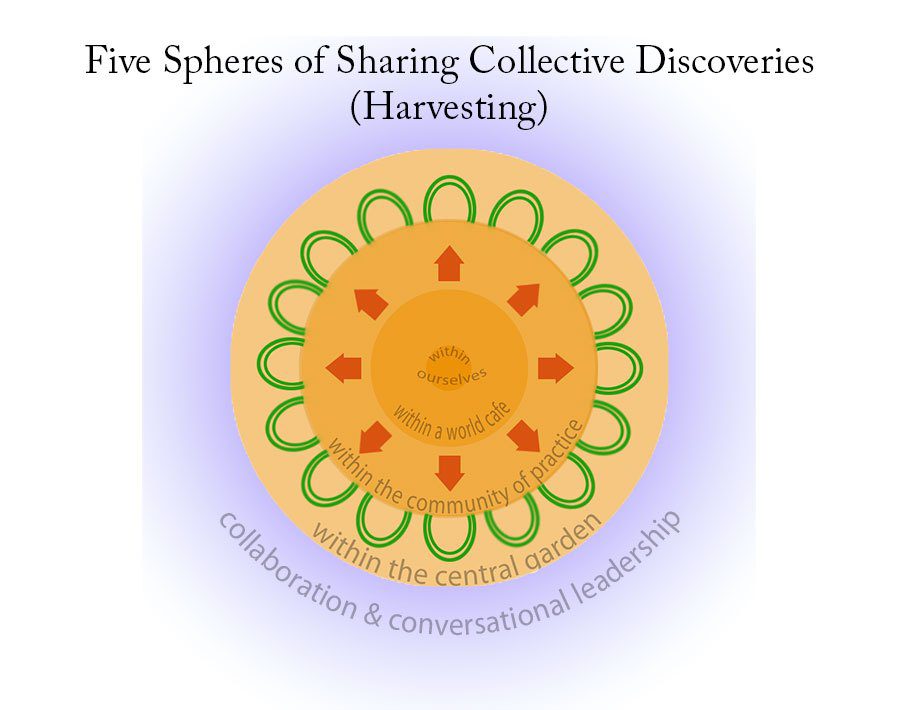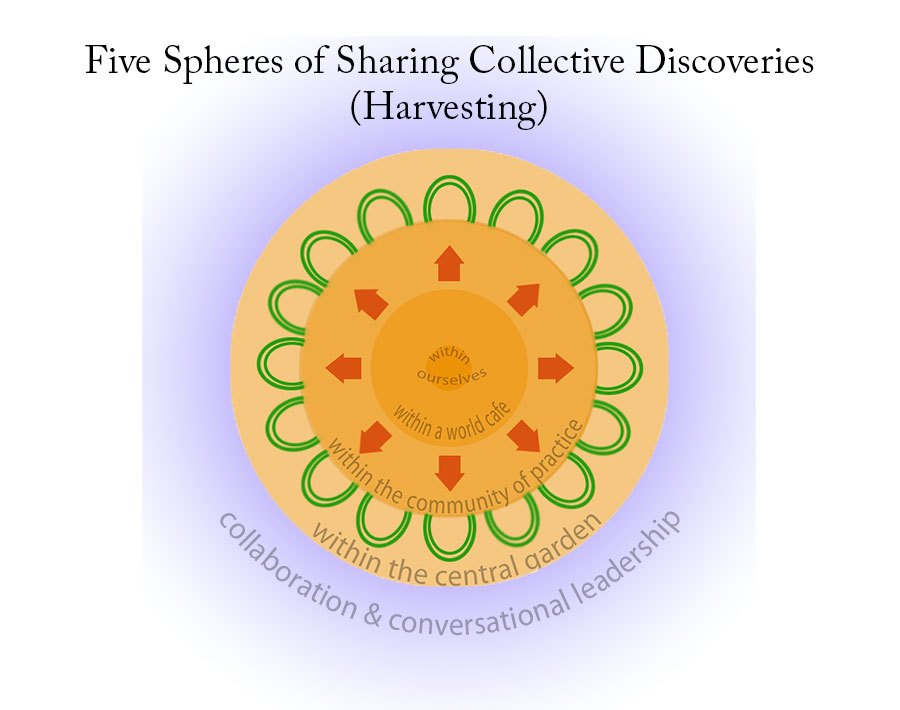
One of the seven design principles of World Café practice – “Share Collective Discoveries” – really has my attention lately…
I imagine this principle, sometimes referred to in practice as “harvesting”, as having several levels, or spheres. These spheres are not hierarchical or even concentric; they can and do all exist at the same time. However, it may be helpful to tease them out a bit here for the purpose of better understanding the full meaning of this principle and its potential application for World Cafe and other dialogue movements.
Sphere One: Within Ourselves
This first sphere of sharing collective discoveries is the most intimate – it has to do with personal “take-aways”; reflections and insights that remain after a World Café or other experiential process has ended and continue to percolate in our thoughts and emotions. The discoveries may have been born in the collective sphere, but this sphere refers to an internal sharing, within ourselves.
Sphere Two: Within a World Cafe or other Participatory Process
This is what we typically think of as the “harvest” from a World Café (or other process); the part where the hosts (preferably with the support of a graphic professional) surfaces individual reflections and reveals patterns among them, and/or identifies choice points or helps to clarify next steps. This “harvest” may result in a written and/or visual document that can be shared among participants or made available to a client or other stakeholders.
Sphere Three: Within a Community of Practice
A third sphere of harvesting, or sharing collective discoveries, is something that can happen within a community of practice after hosting a World Cafe or other process. It’s an open sharing of experience – what worked, what didn’t, etc. – that is part of a larger hosting practice whereby whatever any one individual or team is learning informs the learning and understanding of the whole community.
This is the sphere where we both increase our capacity as individual practitioners and help contribute to the strength of the community/s we are part of. By seeing ourselves as an integral part of a larger group, we increase our collective capacity to use what we are learning, and make a positive difference in the world.
Sphere Four: Within the Central Garden
In this next sphere, we have the opportunity to share our collective discoveries – those we have come to both as individual practitioners and as a functioning community of practice – with other practitioner groups, and learn from them about what THEY are discovering.
This is the sphere of Central Garden dialogue practitioners, and this is where we have a significant collective opportunity to leverage what we are all learning about participatory practice so that we can apply it to the issues we are all grappling with.
As a community of communities we carry an incredible wealth of wisdom, and yet so often we stay within the limits of whatever our primary practice is. While there is enormous value in understanding the depth of these forms – after all, access to the central garden depends on the strength and integrity of the doorways that provide the portals in – the work in the Central Garden transcends form and we need each other’s wisdom to progress and evolve in that sphere.
It has been a huge pleasure to collaborate and learn from my colleagues in the Art of Hosting and the larger field of participatory practitioners. My understanding of my own work has been immeasurably enriched by practices and perspectives I have integrated from shared discoveries, and some of the most fulfilling work I’m doing these days is with Beehive Productions, where we are directly hosting collaboration in the Central Garden. By focusing on topics that are relevant to all practices, everyone involved is able to learn together and benefit from the value of different experiences and perspectives.
Sphere Five: Collaboration and Conversational Leadership
Beyond the Central Garden of dialogic communities (or any particular field of inquiry), there is a fifth sphere where the potential for some of the most effective and cutting edge applications of our work can be found. In collaboration with others in the larger sphere of social innovation pioneers, we can truly live into the promise of our “missions” utilizing Conversational Leadership.
Conversational Leadership posits that without a process or way of working together constructively, without mutual regard and curiosity about those who think differently from you, even the most promising initiative can break down in frustration or conflict among the people involved. Projects fail to meet their goals, and no real change happens. But when the social technologies that World Cafe and other participatory processes provide are activated and play a key role in the dance between people and the issues that otherwise divide them, true and lasting change becomes possible.
But to do that, we need to share what we are learning with those beyond the dialogic community (or other focused community) and learn from what they are seeing and learning and noticing. We need to step in with partnerships and collaborations that can not only raise the level of awareness among us, but create the critical alliances that lead to real solutions and embedded social change.
If we are to equip ourselves to truly address the challenges of this time, I believe we need to cultivate a harvesting practice that takes all five of these spheres into account. A practice that goes beyond the needs of any one event and offers our larger community of communities more opportunities to work together and share our collective discoveries.
We are wiser together. Taking this axiom of World Cafe thought seriously means finding ways to learn together at every scale and become better conduits for wise action.
(This was re-printed from a post I wrote of the same name, for the World Cafe blog earlier this year. It feels particularly relevant now in light of the Hybrid World Cafe I recently co-hosted with NEXUS4change on the concept of the “Central Garden”. It was fantastic, and the first in a series, so stay tuned…)

